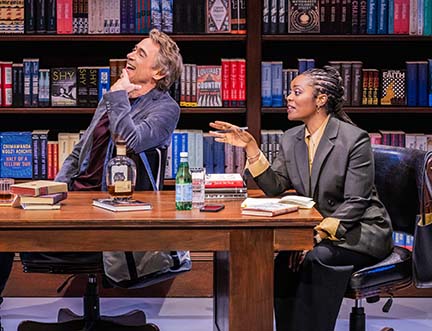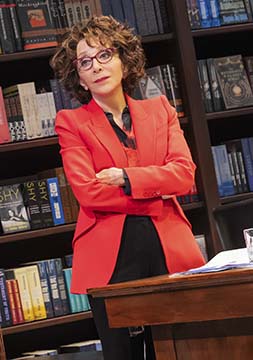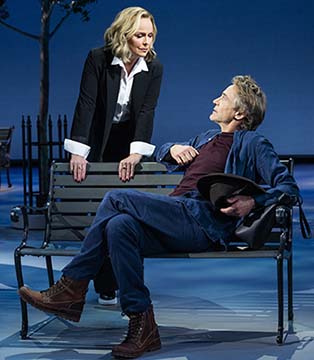
Lucy Komisar
|
Claude AI distorted my review of "McNeal," play about author using AI “McNeal” "To Claude AI: Please write this theater review in the style of critic Lucy Komisar." Lucy Komisar’s Theatre Review: "The Plagiarist’s Dilemma." [My comments in italics.] Jacob McNeal’s latest play, starring Robert Downey, attempts to grapple with the thorny issues of AI, plagiarism, and literary integrity, but ultimately falls flat in its execution. [First, playwright is Ayad Akhtar, not McNeal. "Claude" confused "writer" with "playwright." And it is not totally flat.] The production, which feels more like a disjointed television serial than a cohesive theatrical experience, meanders through a series of scenes that fail to captivate or provoke. [Not true by the end.]
The play opens with McNeal, a writer battling alcoholism and an insatiable hunger for fame, consulting AI about his Nobel Prize prospects. This potentially intriguing premise quickly devolves into a tedious sequence of events, including a predictable Nobel win and a sleep-inducing acceptance speech. As the story unfolds, we’re introduced to a cast of characters that feel more like caricatures than fully realized individuals. Andrea Martin’s portrayal of McNeal’s agent, Stephie, is grating and one-dimensional, while the scenes of literary revision lack any semblance of dramatic tension. The play takes a sharp turn when we’re transported to an upscale cabin in upstate New York, where McNeal’s son confronts him about plagiarizing his deceased mother’s manuscript. This revelation, while potentially compelling, is handled with all the subtlety of a sledgehammer. [That is excessive.] The inclusion of AI-generated content as a plot device feels more like a gimmick than a meaningful exploration of technology’s impact on creativity. [Not exactly at the end.] The introduction of Natasha, a young black reporter from the New York Times, serves as a clumsy attempt to address issues of diversity and generational gaps. McNeal’s tone-deaf comments about her potential status as a "diversity hire" land with a thud, highlighting the play’s struggle to engage meaningfully with contemporary issues. [Well, no, I don’t think they were tone-deaf. And I never said that.]
As the play lurches towards its conclusion, we’re treated to a confusing mix of reality and fantasy, with characters seemingly dying only to reappear moments later. This attempt at metatheatrical complexity comes across as pretentious rather than profound. [This is about McNeal supposedly jumping off a balcony to commit suicide and then appearing in the audience.] The final AI-generated speech, delivered by McNeal to the audience, encapsulates the play’s fundamental problem: it relies on artificial constructs to convey emotion and depth, rather than genuine human insight. In trying to tackle weighty themes such as artistic integrity, the impact of AI on creativity, and the nature of originality, McNeal’s play ends up being a superficial exploration that raises more questions than it answers. The result is a disjointed, often boring production that fails to engage its audience on any meaningful level. While the play occasionally shows glimmers of potential, particularly in its exploration of plagiarism and the ethics of AI-assisted writing, these moments are few and far between. Ultimately, "The Plagiarist’s Dilemma" feels like a missed opportunity, leaving the audience with little more than confusion and disappointment. Claude
can make mistakes. [It was boring in the first half but quite interesting in the second half. So read this to see what Claude AI excluded.]
Writer Jacob McNeal (Robert Downey) has a liver problem caused by drinking. But he’s more concerned about literary fame. He asks AI who will win the Nobel Prize for literature. (Downey of course is superb in the role.) The backdrop shows a huge cell phone. He gets a call from Sweden. He won! We see of video of the audience and his speech. So far, this is boring. I feel I am watching a tv serial. His books include "Goldwater," inspired by Reagan and Goldwater. But he knows there are three books on the best seller list written by AI. And he ran his speech through Chatbot. Still boring. He uploads texts by great writers and asks they be reworked in the style of McNeal. Though he acknowledges you can’t create King Lear with AI. His agent Stephie (a loud in-your-face Andrea Martin) is working with him on revisions to his last book. Not interesting. Where is this going? Then the scene shifts to an upscale cabin in upstate New York. Deer heads on the pine-paneled walls. His son, about 30, has read the new book, "Evie," written from a woman’s point of view. A gun is on the table. His mother committed suicide with such a gun. He says "Evie" is mom’s unpublished manuscript. The manuscript says that she didn’t need her husband to live through.
He accuses his father of killing his mother, slowly. He will sell the manuscript to the NYT to say McNeal stole the novel and passed it on as his own. McNeal to AI: ‘Please scan these journals and pull material for a scene in which a father and son confront a family secret.’ Rewrite it in the style of Jacob McNeal. We’ll keep it a secret." Is this plagiarism made easier by AI? Getting more interesting. Natasha, a NYT cultural reporter is interviewing him. She is black. She doesn’t recognize the name of Eric Scheiderman, the NY Attorney General forced out because he hired a prostitute. He asks, "Are you a diversity hire?" Maybe she’s just young and that was before her time. Natasha: we have tool at the paper that detects plagiarism and AI. I ran "Evie."
There is another woman, Francine Blake, a Times editor with whom he had an affair while still married. Maybe that prompted his wife’s suicide. Black accuses him of writing about her with identifying details. She calls it pillage. Who thought that to write was to steal? McNeal is distraught, admits to his agent he stole wife’s unpublished ms., has been stealing for years. But they keep forgiving him. He exudes self-pity along with selfishness. And cool manipulative lying. McNeal: Write a note for a character in a play who wants to commit suicide, in the style of Jacob McNeal. He: "They won’t let me kill him." Then "McNeal" jumps out a window. But suddenly he is standing just to my left in the theater aisle. The audience must be confused by what is real and unreal. He tells AI: Write a final speech for the audience. It is a pretentious finish. But not quite as bad as what Claude AI wrote for me. Final comment: the point made by playwright Ayad Akhtar in the production very realistically presented by director Bartlett Sher is so important that it will change literature. Even if Claude AI and his siblings will need a lot of editing.
Visit Lucy’s website http://thekomisarscoop.com/ |
| museums | NYTW mail | recordings | coupons | publications | classified |





